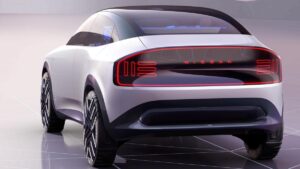Nissan’s vast carmaking plant at Sunderland will be at the centre of a £13 billion investment in developing electric vehicles.
The Japanese carmaker said yesterday that its British factory “would take the lead towards electrification” as it announced investment that will help to develop 23 new electric models by 2030.
“Europe will take the lead on electrification around the world for Nissan,” Ashwani Gupta, the group’s chief operating officer, said in Japan. “In Europe, Sunderland is the one which will take the lead towards electrification.”
The sprawling Sunderland site is Britain’s biggest car factory, employing about 6,000 people. It produces the Nissan Qashqai, one of the most popular cars in Britain, as well as the leaf, the world’s bestselling electric car.
Yesterday the carmaker also released more details and concept images for its new crossover electric vehicle — dubbed the Nissan Chill-Out — that it will be producing in Sunderland, a car that Gupta called “the shape of things to come”, featuring “sleek design, energising driving, advanced safety technologies and a productive and comfortable interior space”.
This year Nissan announced a £1 billion investment in a battery manufacturing plant as well as updates to the Sunderland factory to produce new electric models. Boris Johnson hailed the move as a “pivotal moment” in Britain’s “electric vehicle revolution” and said that it was a vote of confidence in the country after Brexit.
Nissan has said that it will aim for half of its manufacturing output to be electric by 2030. It will be spending twice as much as it did in the previous decade to increase its share of the electric vehicle market in the face of competition from rivals such as Toyota and Tesla.
Makoto Uchida, chief executive of Nissan, said: “The role of companies to address societal needs is increasingly heightened.”
He said that Nissan would “drive the new age of electrification, advance technologies to reduce carbon footprint and pursue new business opportunities . . . We want to transform Nissan to become a sustainable company that is truly needed by customers and society.”
Nissan said that it wanted to reduce lithium-ion battery costs by 65 per cent within eight years. It also plans to introduce all-solid-state batteries, with the potential to store more energy than lithium-ion batteries, by March 2029. Those commitments would make electric vehicles affordable to more drivers, Uchida said.
























0 Comments